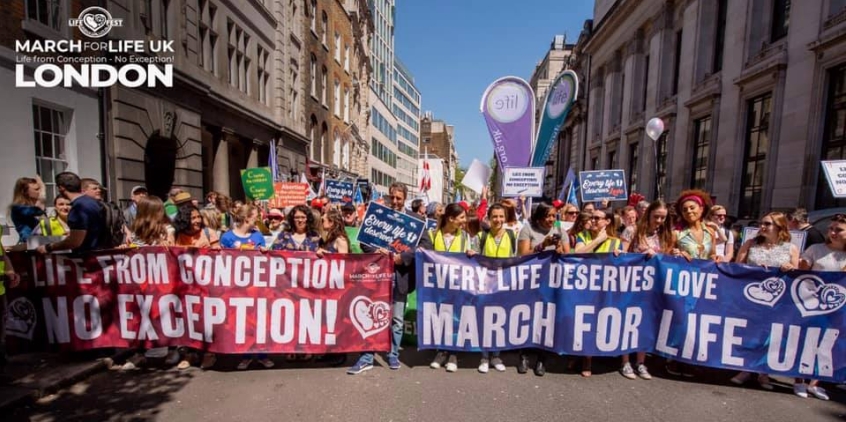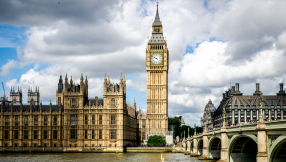
On May 11, people from across the UK will gather in London to make a stand for the unborn as part of the annual March for Life UK.
March for Life UK started in Birmingham in 2012, following in the footsteps of its much more established sister march in the US, which draws huge crowds to Washington DC each year.
While the numbers are still small, organisers are optimistic for the future as the UK march continues to grow year on year - a positive trend that prompted the decision to move the march to London last year.
This year's keynote speakers include abortion survivor Melissa Ohden and Jennifer Christie, a woman who became pregnant after being brutally raped by a serial killer. With the help of her husband Jeff, she went through with the pregnancy and today offers support for women in similar circumstances.
Another guest speaker is Obianuju Ekowcha, who runs Culture of Life Africa, which is giving a voice to African women who feel that the West is trying to impose a pro-choice ideology on the continent.
Christian Today spoke to Isabel Vaughan-Spruce, co-director of March for Life UK, to find out more.
CT: March for Life is relatively young in the UK in comparison to the US but are you happy with the growth you've seen?
IVS: March for Life UK is now in its seventh year and we have seen huge growth each year with numbers increasing at every single event. We have also seen more young people and families turning up to attend which is a really positive sign for the future.
CT: Tell us more about the theme for this year and what you want the march to achieve.
IVS: Our theme for this year is 'Irreplaceable', reminding people that each human being from the moment of his or her conception is a unique individual that cannot be replaced by any other human being.
Sometimes a woman or couple in a crisis pregnancy may be concerned because the timing of this baby isn't what they'd have planned. Maybe they're given a poor diagnosis for the baby's health. Maybe they have financial concerns or their relationship has broken down.
They could feel too young, alone or overwhelmed and that's when there could be a temptation to think 'I'd rather wait until my relationship is more stable, my finances are more comfortable, I'm a bit older, I've finished my studies, my career is more established or I get a better diagnosis for my baby's health etc'.
But even if they were to become pregnant again (and of course abortion can affect a woman's likelihood of becoming pregnant again or carrying a baby to term) this baby will never come again. This baby, this unique little human cannot be replaced, nothing and no one can take the place of any particular individual and we believe the world is worse off with the loss of each of these babies.
Sometimes we hear stories of well known people whose mothers were offered abortions which they courageously refused: these babies grew up to be musicians, celebrities, even a pope – this helps us see more clearly what the loss of one person can mean to the world and what we are losing with every abortion.
But, it is important that we don't value people based on what they do, on what they achieve – a person isn't irreplaceable because they might grow up to have a successful career, become famous, develop great talents or even because they are a good person.
By virtue of being human we are all irreplaceable – because of who we are (human beings) not what we do. Every unemployed man, every woman in a psychiatric hospital, every bedridden old lady, every homeless teenager is unique, of value and irreplaceable.
CT: Do you think the pro-life cause gets a fair hearing - and fair portrayal - in the British media?
IVS: Although the pro-life movement has always been less prominent in the UK than in the US I definitely see an increase of growth here even though that would rarely be noted in any secular media. As with most countries, our secular media rarely portrays the pro-life movement in a favourable light but although it can sometimes take a frustratingly long time, lies are eventually called up for what they are and the truth has its day.
We saw this during recent pushes in the UK to bring in 'buffer zones' around abortion centres to prevent pro-life groups offering alternatives. The pro-life groups have been portrayed as aggressive and judgemental, which couldn't be further from the truth.
I run such a vigil, 40 Days for Life, in my city and when this was being discussed in the secular media it was consoling how many members of the public stopped to tell me (even gave me letters) that they knew what they were reading in the newspapers or hearing on the secular news was lies because they had seen with their own eyes how peaceful and friendly our volunteers were.
CT: What do you want to see from those in power?
IVS: We make no secret of the fact that we would love abortion to be illegal since a civilised country should not support the killing of it's own children but clearly more than that is needed. We need to make abortion unthinkable and for there to be sufficient support and encouragement for mothers/couples so that children aren't thought of as burdens and for adoption to be presented in a more positive light.
CT: The Christian faith is reflected in the March for Life and underpins many pro-lifers' convictions.
IVS: We feel very encouraged with the support we receive from churches but there is always room for growth here from all denominations. We are blessed to have two Catholic bishops attending this year's event, one from the diocese of Westminster, Auxiliary Bishop John Wilson, and one who is coming all the way from Scotland, Bishop John Keenan, who is helping to organise a coach which will be leaving at midnight to reach the venue in time.
We also have a Baptist pastor and his wife who are both speaking at the event as well as Tim Dieppe, head of public policy at Christian Concern. We do have some people who would describe themselves as having no religious beliefs attending the event and it is encouraging to see this diversity as we should all recognise that abortion is no service to women and no answer to problems - but primarily our supporters are Christian as this is an issue that many Christians feel is fundamental to their faith.
I think that although we would like to see religious leaders doing just that and leading, in reality it is often the lay people who have to step out first with these issues. Sadly even those in respected positions within churches can succumb to fear but when they witness a public gathering of thousands of happy, normal, intelligent people of all ages, willing to articulate their views well and back them up with sound reasoning this can give courage and motivation to the fainthearted as well as challenging the general public's opinion on who pro-lifers are.
Because of this I think public events like this are a great way to start discussions with those who hold different beliefs on abortion. It helps overcome that feeling that we have in this country after 50+ years of legalised abortion that it is normal for mothers or fathers to support the killing of their children - we see many normal people who disagree and we give a public voice to those who would usually not be heard from.
CT: Protesters from the pro-choice movement have turned up at past marches. Are you expecting them again?
IVS: We have heard of a pro-abortion opposition group who are planning to turn up on the day of March for Life UK (as they do most years). They have already been posting on social media how they don't want our event to go ahead but I find it interesting as during the recent discussions on buffer zones, when these pro-abortionists were being interviewed on TV, their favourite mantra seemed to be 'go away from abortion centres and into the public square'.
They said that outside abortion centres was the wrong places for us to be and that we should protest at parliament if we wanted to. But now that we are there they don't like us being there either - it seems that although they proclaim choice and free speech, they don't really like women being offered any choices other than abortion or for any voice to be heard other than their own.
CT: The abortion debate seems to be so contentious and passions can run very high on both sides. Is it possible for the two sides to have respectful debate and discussion?
IVS: We have previously contacted the organisers of the opposition groups and asked whether we could meet up before the event to have a coffee and a chat.
We said that the topic of abortion wouldn't be mentioned but that it would just be an opportunity for us to get to know each other as human beings and so have some respect for each other even if we didn't respect the views that the other held.
Sadly this wasn't agreed to but we hope that this gesture helped to show them that we are willing to have a friendly and civilised discussion if they ever are willing.













